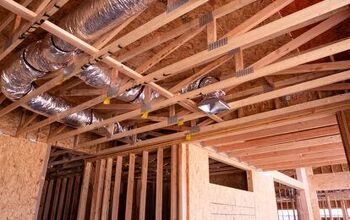How Often Should I Purchase A New Bed?

The bed you sleep in every night is, in most cases, the most frequently used piece of furniture in your entire home. After all, we humans spend an average of one-third of our lives in bed. Yet for some reason, our mattress and bed upkeep is often low on the priority list. If you can’t remember the last time you purchased a new bed for yourself, then it might be time to learn how often you should purchase a bed.
You should replace your bed an average of every seven to 10 years, but this can vary greatly based on several factors. The materials used in your mattress can impact its longevity, with some latex mattresses lasting from 12 to 20 years. The way you maintain your bed, your weight, and how often the bed is used also impacts how when you need to replace your bed.
Beds don’t last a lifetime, no matter how great the mattress is. This means at one point or another, you are going to have to invest in a new bed and get rid of your old one. But beds are not cheap, so it is important you know when it is time to get a new one, so you aren’t purchasing one more frequently than necessary. In order to know exactly how often you should buy a new mattress, you need to know the factors that impact a bed’s longevity.
Five Factors That Impact How Often You Should Replace A Bed
The general rule of thumb is you should purchase a new mattress every seven to 10 years. This is based on all mattresses averaged out. But with so many types of mattresses at endless price points and made of all sorts of materials, there are lots of factors that can impact this number. The top five factors that impact the lifespan of your mattress are listed below.
1. How Well You Maintain The Mattress
Like with most pieces of household furniture, the better you maintain a mattress, the longer it is likely to last. Different mattresses require different forms of maintenance. Cleaning, mattress adjusting, and flipping are among the most common types of mattress maintenance. If you never move or clean your mattress, then you are likely not going to get the longest possible lifespan out of it.
2. Quality Of The Mattress Brand
Not all beds are made with the same level of quality. There is a reason some mattresses cost under $200 while others cost several thousand for a similar type of bed. The craftsmanship put into the mattress and the hardware used can go a long way to affect a bed’s longevity. If you buy from a reputable brand known for quality manufacturing, then you might not have to purchase a bed as soon as you would if you bought a budget-priced mattress.
3. Materials Used In The Bedding
Arguably the biggest variable involved in how often you should replace your bed is the materials used. For example, a classic inner-spring or coil mattress is likely to last between five and seven years, while a modern natural latex mattress should last more than twice that at between 12 to 15 years. This is something to consider when you are choosing between different mattress materials.
4. The Weight Of The Person Sleeping In The Bed
Believe it or not, your weight can have a fairly significant impact on how often you need to replace your bed as well. This is due to the fact that the more you weigh, the more strain your mattress and your bed frame are under. In general, those who weigh more than 250 pounds will likely have to replace a mattress sooner than someone weighing well under 200 pounds.
5. How Often The Bed Is Used
It is also important to consider how often the bed is used. After all, not everyone sleeps in the same bed every night. If you have a bed in a guest room or travel frequently for work, then you are not using your mattress on a daily basis. This usually means you don’t need to replace your bed as often as if you were sleeping in the same bed every night.
Five Warning Signs It Is Time To Replace Your Bed
Now that you are aware of what can impact a bed’s longevity, you should also look out for warning signs that your bed is on its way out. If you notice any of the warning signs below, then you should start saving money to put it towards a new bed.
1. Your Bed Is Not As Comfortable As It Used To Be
If you recently noticed your bed feels harder or less cozy than it once did, this might not just be your imagination. Beds can grow hard and less forgiving over time. Try laying in your bed and see if you can identify if the bed is in fact hardening. If your bed has lost its comfortable pillowy nature, then it might be time for a new one.
2. You Always Wake Up Tired
Listen to your body. If you are going to bed at the same time but are waking up tired, then it might actually be your bed’s fault. This is even more likely to be the case if you wake up both tired and a bit achy in the back or neck. As a bed gets old, it stops offering the same therapeutic support it once did.
Do not neglect this issue. Getting poor-quality sleep can have many negative effects on your body and mind. It can cause muscle and joint pain and you may struggle to focus on work and other important tasks.
3. The Bed Feels Lumpy Or Concave
One of the more obvious signs it might be time for a new bed is a noticeable change in the feeling of the bed. Some old beds can start feeling lumpy or at the very least asymmetrical. If you haven’t been flipping and maintaining your mattress, then your bed can also develop a concave nature. The bed may have a dent where you normally rest your body. This is a sign it is time to start fresh with a new bed.
4. The Springs Have Started To Act Up Or It Makes Noise
Spring mattresses have a shorter longevity than more modern mattresses. They also have unique “signals” that let you know they need to be replaced. Squeaky springs do not always mean your bed needs to be replaced, but it is certainly a possibility.
If a spring has “sprung” out of position, then this is a clear sign you need a new one. In general, springs should go rather unnoticed, so once they start becoming a standout presence, it is time to get a new bed.
5. You Aren’t Sleeping Well
Lastly, and arguably most importantly, if you are not sleeping well and you cannot come up with any other reason, then it could be your old bed. If you have been progressively sleeping worse and worse, or find yourself waking up frequently tossing and turning, or with a sore back, then the bed could be to blame.
If you have a sleep issue, take the time to recall when you purchased the bed. Ask a friend or loved one to sleep in the bed and see if they have a similar issue. New beds may be expensive, but consistently getting a good night’s rest is priceless.
Summing Up How Often You Should Purchase A New Bed
It is essential you have a bed that is comfortable, as it is the one piece of furniture you are almost guaranteed to sleep in every night. An old bed can made it difficult to get a good night's sleep, and give you body aches. This is why it is important to replace your bed an average of every 7 to 10 years.
The frequency in which you need to replace your bed, however, depends on several factors. The quality of the mattress and the materials used to make the bed are the biggest variables. But the way in which you maintain your bed, how often you sleep in it, and even your weight can all impact how often you should replace your bed.
Related Guides:

Tom Gaffey is an expert writer who currently resides in Washington D.C. Tom has a passion for real estate and home improvement writing, as well as travel and lifestyle writing. He lived the last twelve years in Hawaii where he worked closely with luxury resorts and event planners, mastering his knowledge of aesthetics and luxury products. This is where he found his passion for home improvement and a keen interest in DIY projects. Currently, Tom resides in Washington D.C, and also working on his debut fiction novel.
More by Tom Gaffey










![Finishing Basement Without Permit [Is It Really Illegal?]](https://cdn-fastly.upgradedhome.com/media/2023/07/31/9070078/finishing-basement-without-permit-is-it-really-illegal.jpg?size=350x220)
![10 Best Zero Turn Mowers – [2022 Reviews & Ultimate Buyer's Guide]](https://cdn-fastly.upgradedhome.com/media/2023/07/31/9070522/10-best-zero-turn-mowers-2022-reviews-ultimate-buyer-s-guide.jpg?size=350x220)
![10 Best Electric Pressure Washers – [2022 Reviews & Guide]](https://cdn-fastly.upgradedhome.com/media/2023/07/31/9070600/10-best-electric-pressure-washers-2022-reviews-guide.jpg?size=350x220)










![10 Most Dangerous Neighborhoods in Baltimore [Updated]](https://cdn-fastly.upgradedhome.com/media/2023/07/31/9075655/10-most-dangerous-neighborhoods-in-baltimore-updated.jpg?size=350x220)



